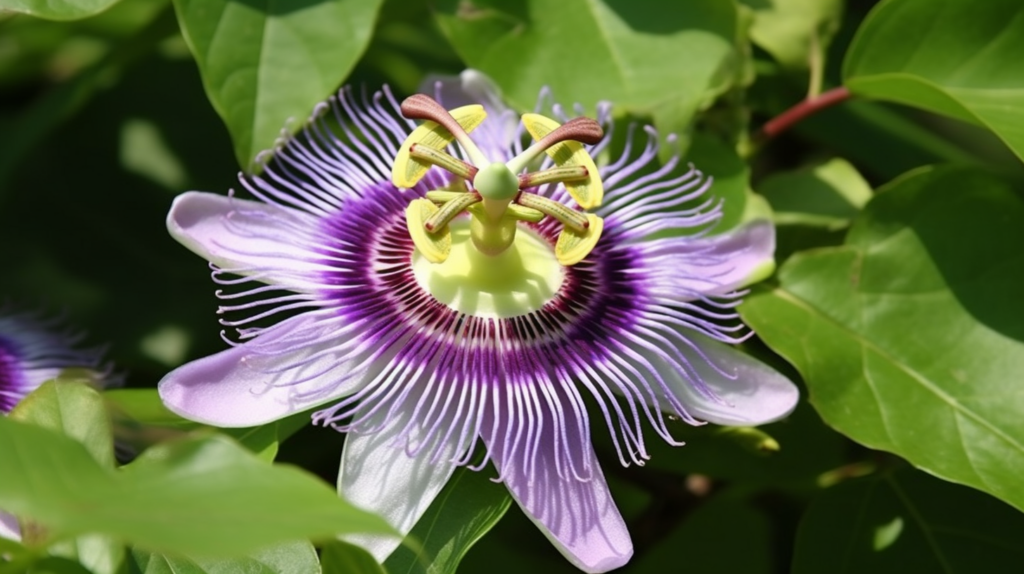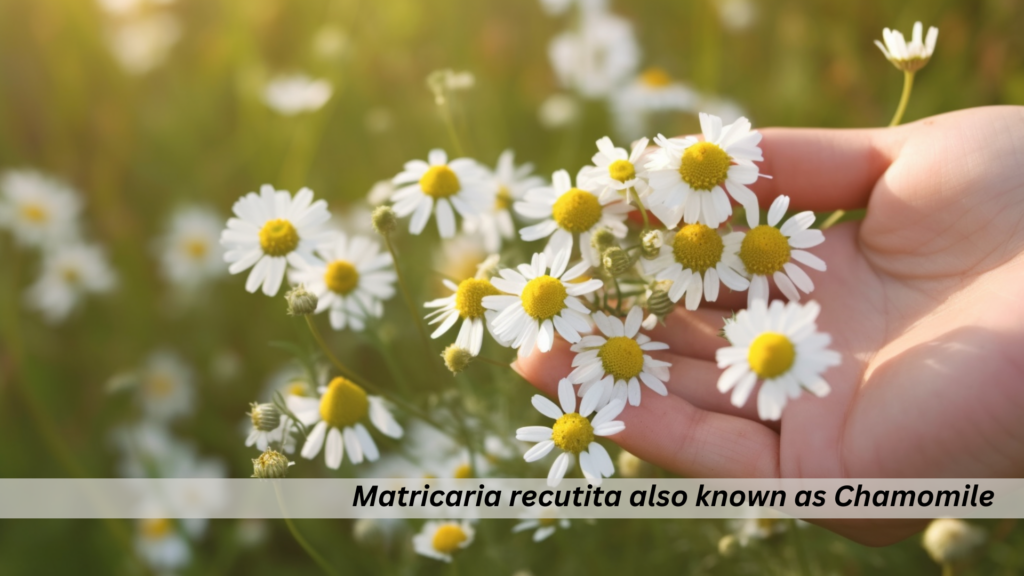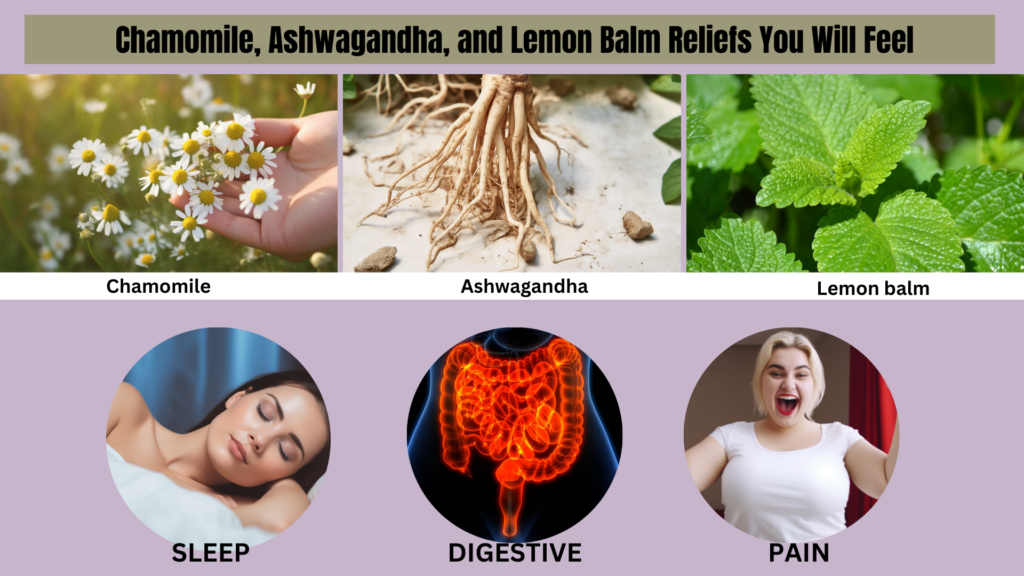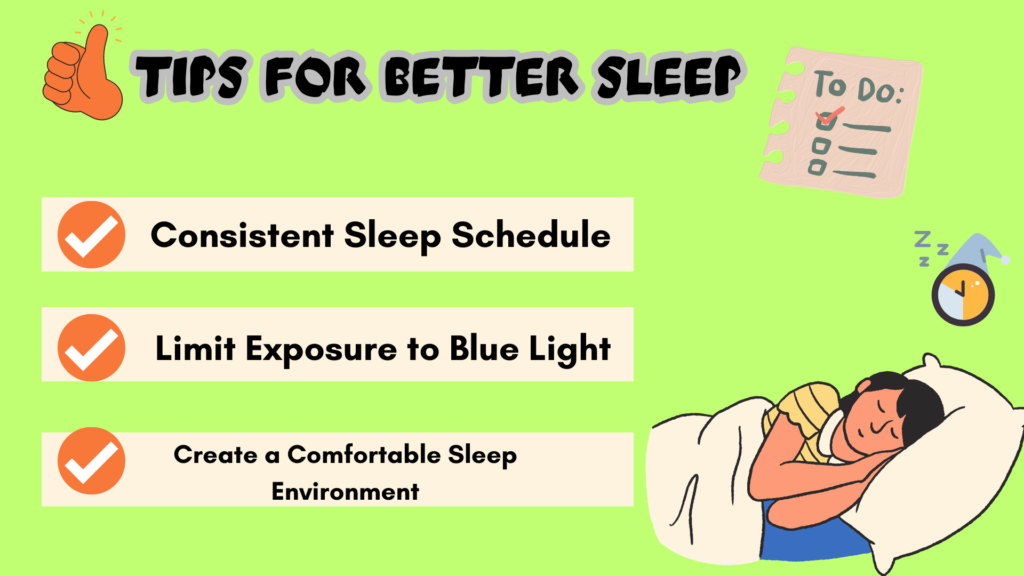In the realm of natural remedies, two botanicals have steadily garnered attention for their therapeutic attributes. This is where we will take a detailed look into the passionflower vs chamomile topic.
Before we get into the meat of it, I’ve got a fun fact for you. Did you know that one of these is native to the United States, and Central and South America, and the other, goes back in history for thousands of years in ancient Greece, Rome and Egypt, and is also common in Europe and Western Asia?
So which one is which? We’ll consider that in more detail as we go on and consider how they stack up in the passionflower vs chamomile showdown. But does the choice really need to be an either-or? Or can it be both?
Both of these have been traditionally used to address a spectrum of ailments, particularly those related to stress and sleep disturbances. As interest in holistic and alternative medicine grows, a comparison between these two esteemed herbs offers insight into their unique benefits and similarities.
But in the debate of passionflower vs chamomile, which truly reigns supreme for the sleep seeker? Dive in with me to discover which bloom might best soothe your nighttime woes.
Before we progress any further, I need to let you know that as much as our aim here is to help you discover which herbs are ideal for certain needs, you need to make sure you’re using them effectively and safely before applying them to your routine by talking to a healthcare professional or herbalist.
Let’s dig more into the Passionflower vs Chamomile discussion!
Table of Contents
What are Passionflowers?
Passionflower, scientifically known as Passiflora incarnata, is a mesmerising tropical plant celebrated for its vibrant purple petals and renowned therapeutic properties.
Native to the United States, Central, and South America, this perennial climbing vine has been historically used for a myriad of purposes, from culinary delights to traditional medicines that address anxiety and sleep disorders.

What are Passionflowers Good for?
In today’s hectic world, passionflower tea stands out as a beacon of relaxation and well-being. This soothing beverage is known for its calming properties, thanks in part to apigenin, a compound that promotes the relaxation-inducing neurotransmitter, GABA, much like Valerian root. 1
Did you know that many people turn to passionflower tea to enhance sleep quality and counter sleep disturbances?
Beyond its sleep-inducing benefits, passionflower tea is believed to support heart health by potentially regulating blood pressure. It’s also packed with antioxidants that combat harmful free radicals, supporting overall health and longevity. 2
Additionally, the tea has been linked to easing menopausal symptoms, offering relief from mood swings, vasomotor disturbances, and sleep issues—serving as a possible alternative for those who can’t or don’t wish to opt for hormone therapy.
What is Chamomile?
Chamomile, scientifically known as Matricaria recutita, is a herb that has been used for thousands of years for its therapeutic properties. Recognised in ancient Egypt, Greece, and Rome, it remains renowned today for its potential health benefits.
This delicate plant, of which there are two main types, German and Roman chamomile, is primarily consumed as a tea. It contains chemicals called flavonoids that contribute to its medicinal effects.

Chamomile has been suggested to aid in relieving anxiety, sleep disturbances, gastrointestinal problems, and certain skin conditions. Some preliminary research points to its efficacy in managing generalised anxiety disorder, premenstrual syndrome symptoms, and blood sugar levels in diabetes. 3
Despite its potential benefits, chamomile can cause side effects in some individuals, particularly those who are allergic to plants in the daisy family, which includes ragweed, marigolds, and chrysanthemums.
Interactions with certain medications, specifically blood thinners, have also been reported, emphasising the importance of consulting with healthcare professionals before integrating chamomile into one’s health regimen. 4 5 6
Stress Relief with Ashwagandha Chamomile and Friends
Ashwagandha and chamomile are both ancient herbs revered for their potential stress-relieving properties.
Originating from traditional Ayurvedic medicine in India, Ashwagandha, whose scientific name is Withania somnifera, sometimes referred to as the “Indian ginseng,” has been utilised as a tonic to enhance both physical and mental well-being.
Research studies suggest its potential to ease anxiety and stress, with some evidence pointing to its sedative effects that might contribute to these benefits.

On the other hand, chamomile, recognised by its daisy-like appearance, is a staple in many cultures as a calming herbal tea. Research has explored its potential as a treatment for generalised anxiety disorder, with findings indicating a possible reduction in the severity of relapse symptoms.
While both herbs offer promise as natural remedies for stress relief, it’s crucial to acknowledge that individual responses can vary and potential interactions with other medications or conditions should be considered. 7 8
Breathe a sigh of relief with Ashwagandha, Chamomile, and Lemon Balm
- Ashwagandha
- Stress Relief
- Ashwagandha, an adaptogenic herb, has been historically used to combat stress and restore balance in the body. Clinical studies have shown its potential in reducing cortisol levels, the body’s primary stress hormone. 9
- Anxiety Relief
- Regular intake of Ashwagandha can help reduce symptoms of anxiety, potentially offering a sense of calm and improved mental clarity. 10
- Pain Relief
- Some believe Ashwagandha might alleviate certain types of pain, although more research is required to validate these claims.
- Stress Relief
- Chamomile
- Sleep Relief
- Chamomile tea is renowned for its natural sedative properties, which can assist in managing insomnia and promoting better sleep.
- Digestive Relief
- Consuming chamomile can help alleviate symptoms of indigestion, gas, and an upset stomach.
- Skin Relief
- The anti-inflammatory properties of chamomile can provide relief from skin irritations when applied topically.
- Sleep Relief
- Lemon Balm
- Stress and Anxiety Relief
- Lemon balm has traditionally been used to improve mood, offering relief from symptoms of stress and anxiety. A study in 2004 highlighted its potential to bring an increased sense of calmness to participants.
- Cognitive Relief
- There’s evidence to suggest that lemon balm can enhance cognitive function, potentially aiding in tasks involving memory and concentration.
- Sleep Disorder Relief
- In combination with valerian, lemon balm may help alleviate symptoms of sleep disorders like insomnia.
- Digestive Relief
- Lemon balm may offer relief to those suffering from indigestion. It has also shown promise in alleviating feelings of nausea.
- Pain Relief
- Lemon balm could be beneficial for those experiencing headaches, especially from stress, and might also offer relief from toothache pain.
- Stress and Anxiety Relief
For a deeper dive into this herbal wonder, check out our passion flower vs lemon balm article.

When you feel relief with ashwagandha chamomile lemon balm, which is a traditional herb known for its therapeutic benefits, your body experiences reduced stress and anxiety levels. These herbs promote relaxation and can improve sleep quality. Over time, consistent use can contribute to enhanced mood and overall well-being.
Passionflower Vs Chamomile – What is the Difference?
As we are back at the chamomile vs passionflower discussion, it is worth reminding oneself that both are renowned for their natural calming and medicinal properties, but they exhibit distinct characteristics and potential benefits.
Chamomile is commonly used as a remedy for ailments such as inflammation, insomnia, and digestive disorders.
It possesses anti-inflammatory and antioxidant properties and can be consumed in teas, essential oils, or supplements.
Passionflower, on the other hand, has historically been used by indigenous tribes to treat insomnia, anxiety, and certain seizures.
Its potential benefits extend to aiding in reducing anxiety and improving sleep quality, with some research suggesting it might have a role in reducing withdrawal symptoms from certain substances.
Both herbs are prevalent in natural remedies, but they offer unique benefits, and their application and efficacy may vary depending on individual needs. So who are you choosing in the passionflower vs chamomile challenge? Or, like me, would you rather have both?
Five Benefits of Passionflower
Activities of Both Extracts in Sleep-Disturbed Rats
In one study, Researchers investigated the activities of passionflower vs chamomile extracts using sleep-disturbed model rats. Chamomile extract, when given at a dose of 300 mg/kg, significantly shortened sleep latency. In contrast, passiflora extract did not have any evident effects on sleep latency even when administered at a dose of 3000 mg/kg.11
Additionally, neither chamomile nor passiflora extracts showed significant effects on the total duration of various sleep states. Further analysis revealed that the sleep-inducing effect of chamomile extract might be related to benzodiazepine activity, as the benzodiazepine antagonist flumazenil counteracted its sleep-promoting effect.

On the other hand, previous studies have indicated some hypnotic potential of chamomile, such as inducing deep sleep in hospitalised patients.
So what was the result of this passionflower vs chamomile study? Overall, chamomile showed potential as an herbal product with hypnotic activity, whereas passiflora did not exhibit significant hypnotic effects in this model.
For better sleep what do researchers say?
Researchers have provided several recommendations for improved sleep based on extensive studies. Here are three widely-accepted tips that you can do anywhere:
- Consistent Sleep Schedule
- It’s essential to keep a regular sleep routine, going to bed and waking up at the same time every day, even on weekends. This helps regulate the body’s internal clock and can improve the quality of sleep. 12
- Limit Exposure to Blue Light
- The blue light emitted by screens on smartphones, computers, tablets, and televisions can hinder the production of melatonin, a hormone that controls sleep-wake cycles. Reducing screen time, especially before bedtime, can enhance sleep quality. 13
- Create a Comfortable Sleep Environment
- Ensure the bedroom is cool, dark, and quiet. Using earplugs, an eye mask, or a white noise machine can further create an environment conducive to sleep. Making sure the mattress and pillows are comfortable is also important. 14

It’s always good to remember that what works best can vary from person to person. Some might benefit from additional strategies like meditation, while others might find relief in certain herbal teas or supplements. It’s essential for you to find what works best for you.
So, when you combine a healthy approach to your sleep routine with either of your choices in passionflower vs chamomile, you’re setting yourself up for a win!
For more tips and tricks on getting a good night’s sleep, check out the Lose Weight Sleeping Better; 10 Tips To Hack Optimal Recovery article which also discusses how you can lose weight sleeping.
FAQS
Is Passionflower stronger than Chamomile?
Based on the discussion considering passionflower vs chamomile, it’s evident that both passionflower and chamomile possess therapeutic properties beneficial for stress and sleep disturbances. However, it’s not explicitly stated which of the two is categorically stronger.
To accurately determine their relative strengths, direct comparative scientific studies would be required.
Is Passionflower the same as Chamomile?
No, passionflower and chamomile are not the same. They are two different distinct plants with their own unique properties.
Can you mix Chamomile and Passionflower?
Yes, chamomile and passionflower can be mixed and are often combined in herbal preparations to enhance their soothing and sedative properties. Both herbs are known for their calming effects, and when used together, they can complement each other.
What can you not mix with Chamomile tea?
Chamomile tea may interact with certain medications, including blood thinners, sedative drugs, and some antifungal agents. It’s advisable to be cautious when consuming chamomile alongside these drugs to avoid potential interactions. Always consult with a healthcare professional before combining chamomile with any medication or other herbs.
Conclusion
In the realm of natural remedies, both passionflower and chamomile have emerged as potent solutions for various ailments. Passionflower, primarily known for its anxiolytic effects, provides a non-addictive solution to manage anxiety and can also aid in insomnia.
On the other hand, chamomile’s vast array of activities extends from soothing digestive issues to acting as an anti-inflammatory agent and a sleep aid. While both herbs offer unique benefits, they share a common thread in promoting relaxation and well-being.
The therapeutic potential of natural herbs such as chamomile, passiflora, ashwagandha, and lemon balm has been highlighted in various supporting studies, and these can be complementary. These botanicals possess activities that support relaxation, reduce anxiety, and promote sleep quality.
Such properties emphasise the importance of exploring and utilising nature’s pharmacopeia for overall well-being, providing an alternative or complementary route to conventional pharmaceuticals.
Are you interested in delving deeper into the fascinating world of passionflower and its myriad benefits? We’ve crafted a comprehensive article that delves into its history, uses, benefits, effects and more. To uncover the secrets of this exotic botanical, check out our article What Is Passionflower Tea Good For?
Do you want the inside scoop? Sign up for our mailing list to receive more valuable insights on gut health, chamomile, passionflower and other natural remedies, as well as updates on the latest research and information on herbal medicine. Also, join the Passionflower vs Chamomile discussion on Instagram and Pinterest and share your thoughts.
References
- “Passiflora incarnata L. (Passionflower) extracts elicit GABA currents in hippocampal neurons in vitro, and show anxiogenic and anticonvulsant effects in vivo, varying with extraction method” – S. M. Elsas, D. J. Rossi, J. Raber, G. White, C. A. Seeley, W. L. Gregory, C. Mohr,b T. Pfankuch, and A. Soumyanatha, 10 April 2010 [PubMed] [Archive] ↩︎
- “What Is Passionflower Tea Good for and Are There Any Side Effects?” – M. Juber, 1 November 2022 [Medicine Net] [Archive] ↩︎
- “Chamomile: A Review of Its Traditional Uses, Chemical Constituents, Pharmacological Activities and Quality Control Studies” – Y. L. Dai, Y. Li, Q. Wang, F. J. Niu, K.-W. Li, Y. Y. Wang, J. Wang, C. Z. Zhou, and L. N. Gao, 23 December 2020 [MDPI] [Archive] ↩︎
- “Chamomile” – NCCIH Staff, Last checked 16 August 2023 [PubMed] [Archive] ↩︎
- “What Is Chamomile?” – R. Griffin, 21 April 2023 [WebMD] [Archive] ↩︎
- “What are the benefits of chamomile tea?” – Z. Villines, Last checked 16 August 2023 [Medical News Today] [Archive] ↩︎
- “9 herbs of anxiety” – L. Richards, Last checked 16 August 2023 [Medical News Today] [Archive] ↩︎
- “Ashwagandha” – R. Griffin, Last checked 16 August 2023 [WebMD] [Archive] ↩︎
- “Anti-Stress Effects of Lemon Balm-Containing Foods” – A. Scholey, A. Gibbs, C. Neale, N. Perry, A. Ossoukhova, V. Bilog, M. Kras, C. Scholz, M. Sass, and S. Buchwald-Werner, 30 October 2014 [PubMed Central] [Archive] ↩︎
- “10 Benefits of Lemon Balm and How to Use It” – E. Cronkleton, Last checked 16 August 2023 [Healthline] [Archive] ↩︎
- “Hypnotic activities of chamomile and passiflora extracts in sleep-disturbed rats” – K. Shinomiya, T. Inoue, Y. Utsu, S. Tokunaga, T. Masuoka, A. Ohmori, and C. Kamei, 19 November 2004 [PubMed] [Archive] ↩︎
- “Good Sleep for Good Health: Get the Rest You Need” – NIH Staff, Published April 2021 [News In Health] [Archive] ↩︎
- “How Blue Light Affects Sleep” – R. Newsom, Updated 17 March 2023 [Sleep Foundation] [Archive] ↩︎
- “What is the Ideal Sleep Environment and Conditions for Quality Sleep?” – J. Zwarensteyn, Last updated 25 July 2023 [Sleep Advisor] [Archive] ↩︎
Last Updated on 6 months by D&C Editorial Team




